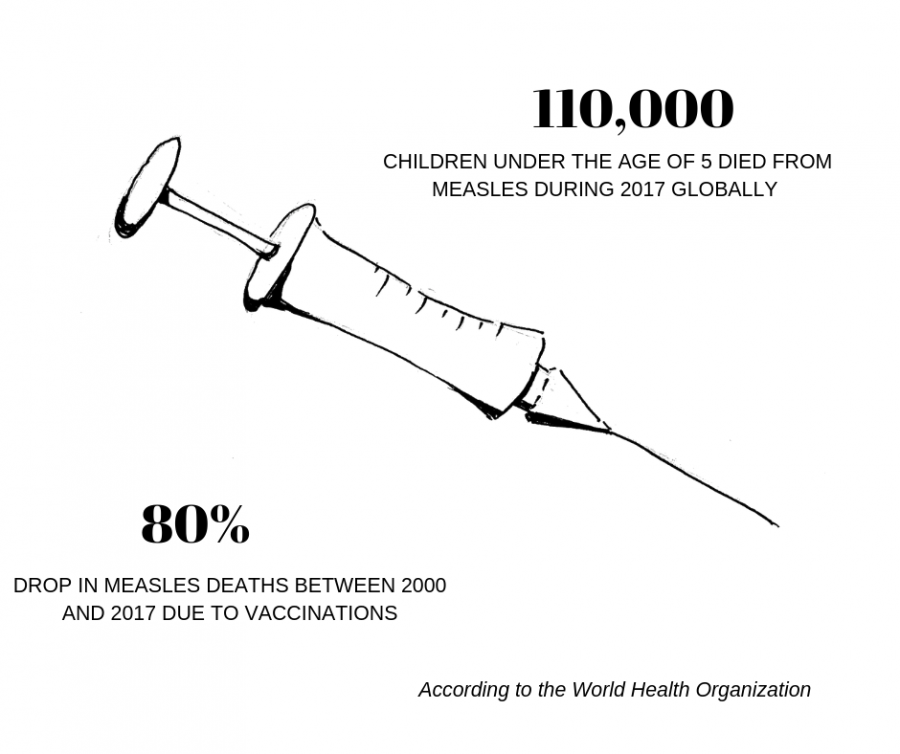Misconceptions can kill the defenseless
Vaccines promote public safety, ensure individual health
Staff writer Patrick Li writes that the misconceptions that float around about vaccination should not detour people from getting life saving vaccination in order to not spread disease to those that cannot be vaccinated.
June 16, 2019
Dozens of men, women and children lay in beds, their entire bodies smothered in large, oozing bumps. When colonists set foot in America, they spread the lethal smallpox virus to Native Americans.
These are the symptoms of the viral infection smallpox. With the itches and blisters come the likelihood of death. In the past, when there was no immunization for this disease, the rate of death as a result of smallpox was up to 95 percent.
There seemed to be no cure, until the concept of the vaccine was developed. By introducing a weak version of the virus into a healthy person, they became immune to the regular virus.
Smallpox was eradicated in 1980 and measles was deemed eradicated in 2000 thanks to the extensive use and improvement of vaccines, but recently some people are beginning to forget or deny the importance of vaccines. Known as “anti-vaxxers,” they believe that vaccines do not work and cause side effects such as autism and sudden infant death syndrome.
Often the stance against vaccines results from children getting one of these “side effects” shortly after a vaccination and their parents blaming it on the vaccines. This false and dangerous belief, often fueled by emotions, that vaccines are more harmful than helpful is risking the lives of innocent children and causing a comeback in these previously eradicated diseases.
Currently, 47 states allow “religious exemption” for vaccinations. Although vaccines may be against the religious beliefs of some people, their decision not to be vaccinated puts other people at risk.
People living with medical conditions that prevent them from being vaccinated are protected with what is known as “herd immunity.” Herd immunity prevents the spread of contagious disease if a certain threshold of the population is vaccinated. We can easily achieve this threshold if everyone who is able to be vaccinated does so, which is why mandatory vaccination should be enforced.
The anti-vaxxers do not have scientific evidence backing them up. According to the National Institute of Health, the effectiveness of vaccines ranges from 98 to 100 percent. In five studies from 2002 to 2007 involving over one million children, the researchers concluded that “there was no relationship between vaccination and autism.” However, anti-vaxxers continue to ignore studies that disprove the connection between vaccines and autism, citing a retracted 1997 study by discredited doctor Andrew Wakefield, involving only 12 children.
According to the New York Department of Health, an outbreak in New York involving 535 cases of measles in Brooklyn and Queens is mostly attributed to members of the Orthodox Jewish community, even though leaders in Jewish community have stated that vaccinations are not forbidden in Jewish law.
There would be no such risk if mandatory vaccination was implemented, nullifying “religious exemption.” As of May 26, the National Vaccine Information Center still states the following on New York residents: “This section shall not apply to children whose parent, parents, or guardian hold genuine and sincere religious beliefs which are contrary to the practices herein required, and no certificate shall be required as a prerequisite to such children being admitted or received into school or attending school.”
Measles was declared eliminated in 2000, but it has made a comeback thanks to the increasing number of anti-vaxxers. According to the Center for Disease Control and Prevention, there are already 880 cases of measles this year as of May 26― a record number of infected people since 1992. Assuming that the number of measles cases grows at the current rate, there will be almost two thousand cases by the end of the year.
As we have seen for the past twenty years, anti-vaxxers are not going to change their minds anytime soon. Instead of trying to argue with them, we should instead pass laws that will end this issue once and for all such as requiring vaccination to attend school. Public safety comes before personal beliefs.










